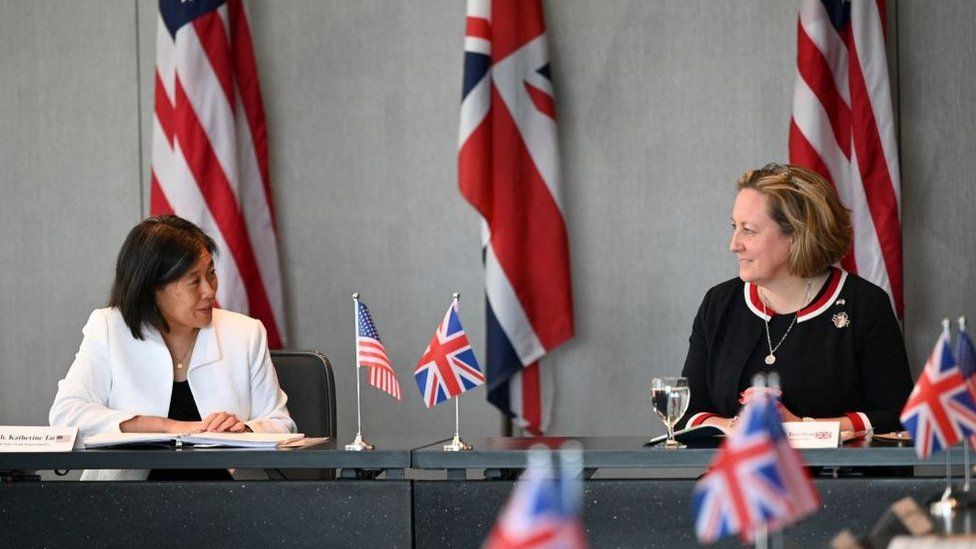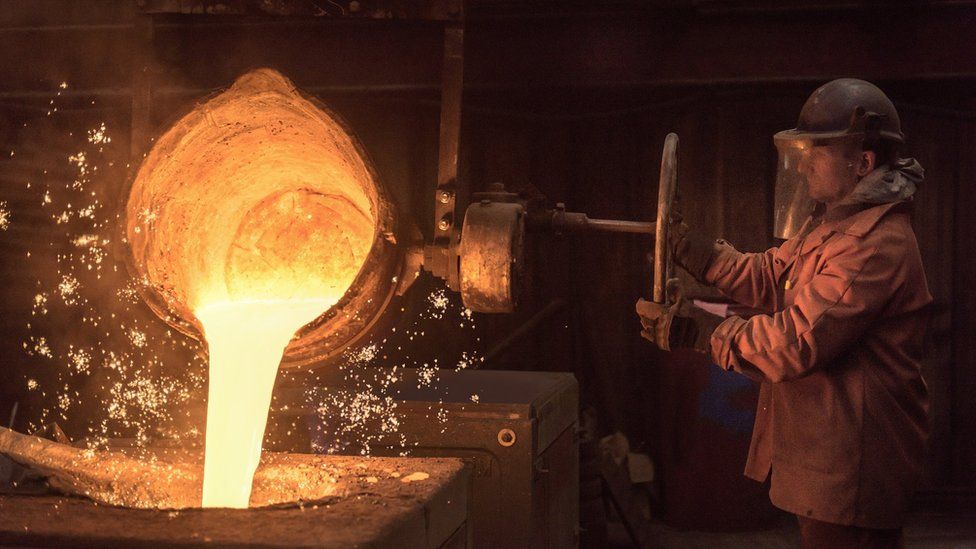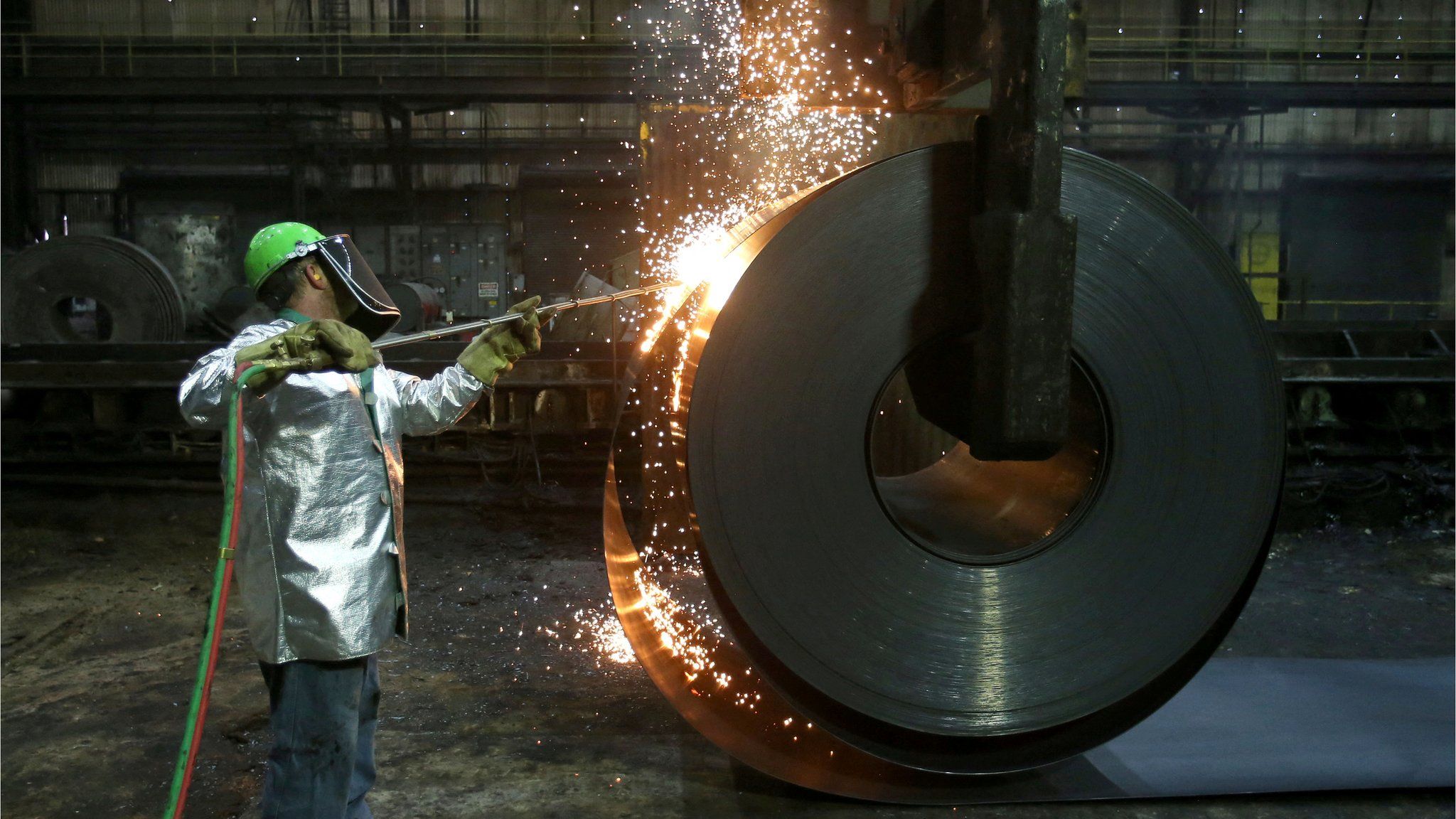The deal follows similar agreements the US has reached with allies including the European Union.

Image source, Getty Images
The US has agreed to ease Trump-era tariffs on UK steel and aluminium shipments, resolving an issue that had strained relations between the allies.
The move follows earlier deals with the European Union and Japan over the controversial taxes, which were imposed by former President Donald Trump in 2018 in the name of national security.
In exchange, the UK will suspend extra import taxes it had put on US products such as bourbon and Levi’s jeans.
Business groups welcomed the decision.
Under the agreement, the US will replace the 25% tariffs on steel with a quota system, which ensures duty-free treatment to metals shipments up to a certain level, in this case comparable to 2019 shipments, according to the US. The deal will go into effect 1 June.
International Trade Secretary Anne-Marie Trevelyansaid the deal had removed a “very frustrating irritant”, calling the agreement “good news for the steel and aluminium sectors, which support the jobs of over 80,000 people across the UK”.
“It means our manufacturers can now enjoy a high level of tariff-free access to the US market once again,” she said.
“Hopefully we can now move forward and focus on deepening our thriving trading relationship with the US”.
Free trade deal next?
US officials also welcomed the suspension of the UK retaliatory tariffs, which they said affected about $500m worth in annual trade.
“The historical deal announced today delivers on President Biden’s vision to repair relationships with our allies while also helping to ensure the long-term viability of our steel and aluminium industries,” said Ambassador Katherine Tai.
However, in an interview with the BBC, Ms Tai, the top US trade negotiator, refused to be drawn as to when or if discussions for a formal free trade agreement might start.
The Biden administration has prioritised domestic goals ahead of trade, said economist Chad Bown, senior fellow at the Peterson Institute for International Economics.
While that could change as the US seeks stronger relations with allies in the context of Russia’s invasion of Ukraine, he said there’s no evidence of that happening yet.
“The US administration has not made any signs that they want to do trade agreements with anybody anytime soon,” he said. “That would be a big change.”
Trump tariffs

Image source, Getty Images
The Biden administration’s low prioritisation of trade matters marks a major shift from former president Donald Trump, who made it a signature area of focus, using tariffs as bargaining chips in diplomacy.
He set off a firestorm of criticism in the US and abroad when he announced the 25% tax on foreign steel shipments and 15% tax on foreign aluminium, citing a need to preserve America’s manufacturing base and rejecting concerns that tariffs raise prices.
After allies, including the UK, hit US products such as Harley-Davidson motorcycles in retaliation, Mr Trump backed off the duties for certain countries, including Canada, opting for quotas instead.
US President Joe Biden later reached similar deals with the European Union and Japan.
The approach has won praise in the US, including from groups like United Steel Workers for responding to the concerns of allies while still providing protection for US manufacturers.
With many steel plants located in key election states, maintaining support from those workers is important for Mr Biden.
On Tuesday the union praised the new deal for measures it said would help safeguard against unfairly subsidised steel production, such as mandatory annual audits of British Steel, which has a Chinese parent company.
Business lobby UK Steel also praised the deal, saying it would be “felt by steel companies and their employees right across the UK and is immensely welcome”.
But with the quotas in place, consumers are unlikely to see benefits like lower prices, said Phil Levy, economist for Flexport.
“Replacing tariffs with a system of quotas is actually moving away from transparency on these things and it does not get you the benefits of free trade,” he said.
The US and UK traded more than $260bn worth of goods last year, of which the majority were exports from the US such as metals, aircraft parts, oil and gas.
While America accounts for nearly one fifth of total UK trade, the UK market represents just 5% of US exports.
Mr Bown said the US imports too little British steel for a deal to have significant impact on prices. For UK consumers of American products, the impact on prices is also likely to be marginal, he said.
“It can’t hurt the consumer, so it will make them better off, but by how much is I think unclear,” he said.


With America buying £1 in every £6 of British exports, the cooling of tensions over steel has raised hopes of a reheating of the wider transatlantic trade relationship.
Levi’s jeans, Harley Davidson motorbikes, steel bars and bourbon whiskey became unlikely weapons in a painful battle that has waged since 2018, with their producers and consumers paying a hefty price. For them this ceasefire will be welcome, if overdue.
At the heart of the dispute was the protection of American jobs. And if – and it’s by no means certain – these developments are the first step towards the resumption of wider free-trade talks, that theme will continue to loom large, even if the man in the White House has changed.
The Biden administration struck a deal with the EU over steel almost five months ago. There’s been speculations that the UK was made to wait due to unease over the way Boris Johnson’s government has handled post-Brexit trading arrangements in Ireland.
The UK is keen to demonstrate its Brexit-era agility by notching up more trade agreements – but the US will be keen to continue showing it’s calling the shots .

- 24 December 2021

